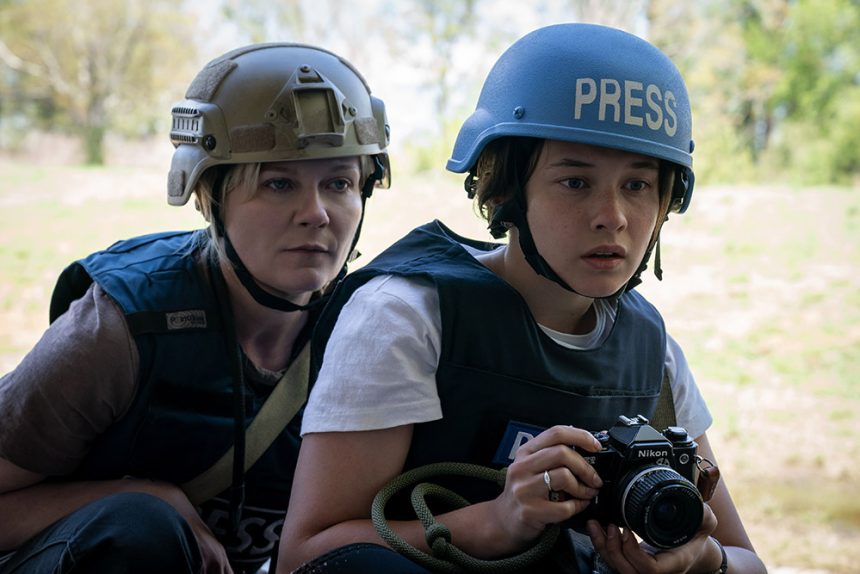Alex Garland’s dystopian Civil War, about America torn asunder by a president run amok and brutal acts of war committed on ordinary citizens, sparked plenty of speculation — and assumptions — heading into its debut in theaters over the April 12-14 weekend.
Would it be a win in blue states but a losing battle in red states? Would it galvanize those Trumpians eager to view the sort of imagery witnessed during the Jan. 6 attack on the U.S. Capital? Or would liberals assume it would be a balm for their point of view, and see them turn out in full force? After all, Hollywood isn’t known for being a bastion of Republicans. Ditto for indie studio A24, which produced the film.
In a surprise twist, Civil War played exactly down the middle as both sides put aside their differences and sat together in cinemas across the country to see for themselves what all the buzz was about. Precisely 50 percent of ticket buyers identified as conservative and the other 50 percent as liberal, according to final exit polling data from the weekend. A24 is notoriously media-averse, but a source close to the project shared the post-weekend findings with THR.
Rival studio execs readily confirm that Civil War played well in blue states and in red states. “Both sides were interested. A24 did a good job of not leaning in either way politically,” says a distribution chief at another studio.
Garland’s film opened to a notably better-than-expected $25.7 million, a record for A24. The $50 million movie is the indie studio’s biggest swing to date. In keeping with its penchant for using film to spark conversation, it never intended to make a movie that glorified one political party or another — to the point that some liberals were upset.
“Civil War is an abrasive and uncomfortable film, not because it fully subscribes to any particular ideology, but because it doesn’t — and we hate not having clearly defined sides to root for or against or media that doesn’t perfectly align with our worldview so we can walk out of the theater confidently knowing we’re a good person,” wrote columnist Richard Newby for The Hollywood Reporter.
In the Los Angeles, New York and Denver areas, Civil War skewed liberal or was an even 50-50 split, according to the detailed polling data. And it over-indexed notably in Los Angeles and San Francisco, according to PostTrak polling.
Markets where the majority of the audience skewed moderate or conservative included Phoenix, Kansas City, Mo. and Dallas.
Civil War over-indexed in a number of high-grossing smaller markets that lean conservative, including Sacramento, Calif., El Paso, Texas, Oklahoma City, Albuquerque, N.M., Waco, Texas, Brownsville, Texas, and Colorado Springs, Colo. In terms of liberal-leaning markets, Civil War over-indexed in Portland, Ore.
And, interestingly, the data shows that 70 percent of ticket buyers in Denver, Kansas City and Phoenix were military “adjacent,” meaning they had a family member or friend in the military. Another notable tidbit: the oldest audience by far was in Kansas City, a conservative-leaning market where 55 percent of ticket buyers were 35 and older.
Civil War’s subject matter was the top draw, with more of the audience citing the political dystopian storyline as the reason for showing up than either its action or an interest in indie films, although by a relatively narrow margin (each grouping made up around 1/3 of the audience, but subject matter was the highest).
The action component helped the film play well across all major markets, while cinephiles turned out in force in indie strongholds including L.A. and New York City.
Overall, 57 of the audience was between ages 18 and 34, which is the sweet spot for A24, known for films such as Hereditary, The Iron Claw and the X horror trilogy. Civil War skewed heavily male, or 63 percent, in keeping with the typical breakdown for an action movie.
Civil War follows a wartime photojournalist (Kirsten Dunst) and her colleagues as they make their way across a hostile United States of America that has been torn between the forces of the United States and the secessionists known as The Western Front, comprising California and Texas. The Western Front is fighting the authoritarian rule of a three-term president (Nick Offerman) who has disbanded the FBI.
Civil War‘s first trailer turned heads with the revelation that California and Texas were allies, despite their real-life political differences. Those who know how A24 operates say the studio probably considers the film’s B- CinemaScore a badge of honor because it wants its films to be divisive. Certainly, it seems to have sparked plenty of conversation.
“It played well everywhere,” says a rival studio executive as he ticked off the top-grossing markets, led by Los Angeles, New York, Dallas, San Francisco, Chicago, Houston, Washington DC, Toronto, Denver and Phoenix.











